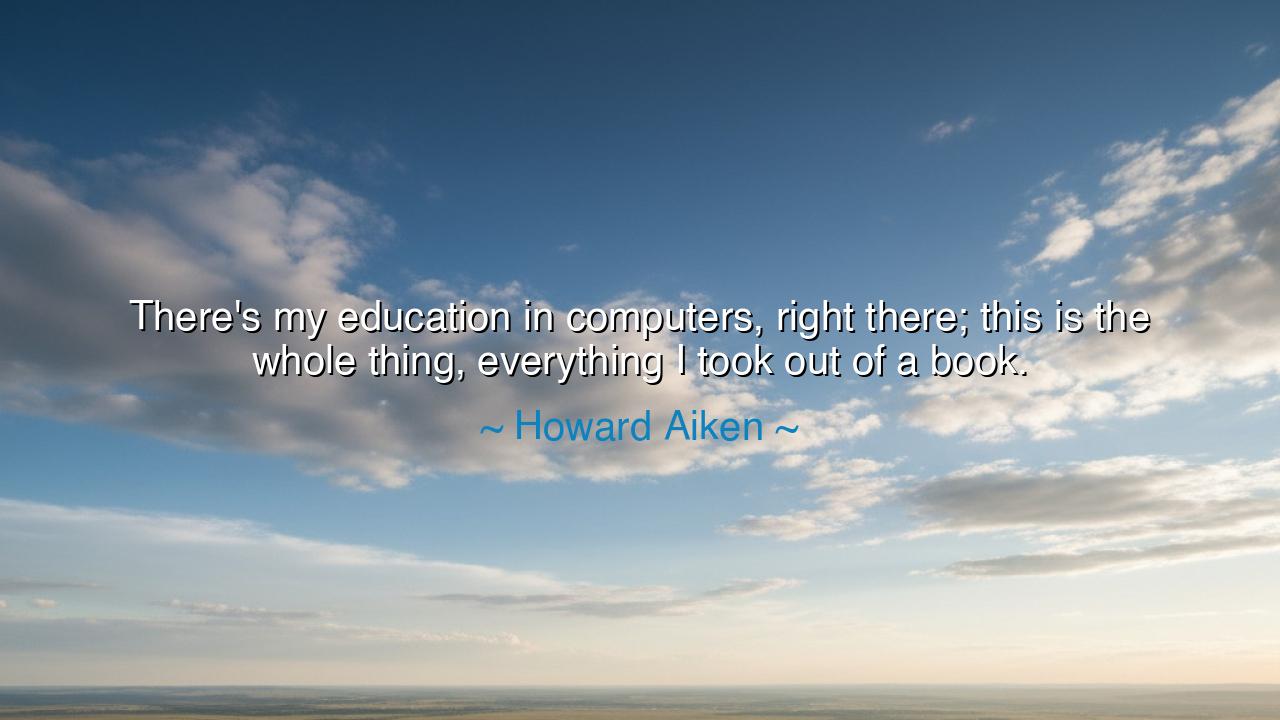
There's my education in computers, right there; this is the whole
There's my education in computers, right there; this is the whole thing, everything I took out of a book.






"There's my education in computers, right there; this is the whole thing, everything I took out of a book." – Howard Aiken
In the vast history of human progress, there have been few inventions as transformative as the computer. Yet, Howard Aiken’s words strike at the heart of a profound truth: true education in the realm of technology is not solely about the accumulation of facts and theory from books. Rather, it is about the practical application and the hands-on understanding of how these principles work in the real world. Aiken’s insight draws attention to the difference between learning as it is taught in the pages of a book and learning through the process of creation and experience. The books may offer knowledge, but it is in the application of that knowledge where true understanding lies.
In the ancient world, the Greeks understood this distinction well. Plato, for instance, was deeply committed to the idea of learning through dialogue, believing that wisdom came not from passive reception of knowledge but from active engagement with ideas. Similarly, Aristotle, while writing extensively on countless subjects, emphasized the importance of practical experience in gaining true understanding. The ancient philosophers knew that to know something was not enough—it was the application of that knowledge that brought wisdom. Just as Aiken reflects, true education in the realm of computers, or any field, comes not just from reading books, but from doing, from creating, and from seeing the theory come to life in real-world scenarios.
The story of Archimedes, one of the greatest minds of ancient Greece, offers a perfect example. While Archimedes wrote extensively about the principles of mathematics and engineering, it was his hands-on experiments—like the discovery of the principle of buoyancy—that allowed him to unlock the deepest truths of the physical world. He did not simply read about the laws of nature; he interacted with them, experimenting, testing, and refining his understanding. Aiken’s quote echoes this sentiment: the true knowledge of a subject is not just found in books but in the practical mastery and experience one gains through working with it directly.
Similarly, in the Renaissance, we see the same emphasis on action and experimentation. Leonardo da Vinci, while a scholar and artist, was also an inventor and engineer who brought the theories of his time to life through hands-on projects. His notebooks are filled not just with theories but with sketches and designs of inventions that never came to fruition in his lifetime but laid the groundwork for the future of technology. Da Vinci’s work is a testament to the fact that knowledge, no matter how vast, is incomplete until it is tested in the real world. In the same way, Aiken’s reflections on computers remind us that education is not merely about absorbing information, but about translating that information into action.
In the world of computing today, Aiken’s insights remain ever-relevant. Engineers, programmers, and designers do not simply learn by reading about code or hardware—they learn by building, by writing programs, and by designing and testing systems. Much like the ancient philosophers who used dialogue as a method of refining their understanding, modern technologists refine their knowledge through trial and error, problem-solving, and continuous iteration. The digital age is built upon the shoulders of those who did—who didn’t just study theory, but who embraced the practical, messy, and often imperfect process of creation and experimentation.
The lesson in Aiken’s words is one of action and engagement. It is not enough to simply read or learn abstract concepts; true mastery comes from experiencing, doing, and applying that knowledge in the world. Just as the great thinkers of the past understood the value of practical application, we must also recognize that our own growth and understanding come through action. Whether in the realm of technology, philosophy, or art, it is through engagement with the material world—through creating, testing, and failing—that we unlock the deepest lessons.
In our own lives, let us embrace the wisdom of Howard Aiken. While books are important and knowledge is valuable, the true essence of learning lies in the experience we gain through action. Just as Archimedes, Leonardo, and countless others used experimentation to refine their understanding, we too must take what we have learned and bring it to life. Whether we are learning a new skill, starting a business, or simply navigating the challenges of life, it is through doing that we truly understand, grow, and evolve. Let us seek not only the knowledge found in books but also the wisdom found in action. Education, in its truest form, is the marriage of theory and practice, where our ideas take shape and become a living part of the world around us.






AAdministratorAdministrator
Welcome, honored guests. Please leave a comment, we will respond soon